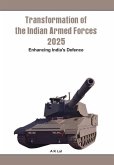Existing models of state formation are derived primarily from early Western European experience, and are misleading when applied to nation-states struggling to consolidate their dominion in the present period. In this volume, scholars suggest that the Western European model of armies waging war on behalf of sovereign states does not hold universally. The importance of 'irregular' armed forces - militias, guerrillas, paramilitaries, mercenaries, bandits, vigilantes, police, and so on - has been seriously neglected in the literature on this subject. The case studies in this book suggest, among other things, that the creation of the nation-state as a secure political entity rests as much on 'irregular' as regular armed forces. For most of the 'developing' world, the state's legitimacy has been difficult to achieve, constantly eroding or challenged by irregular armed forces within a country's borders. No account of modern state formation can be considered complete without attending to irregular forces.
Table of contents:
1. Introduction: contemporary challenges and historical reflections on the study of militaries states and politics Diane E. Davis; Part I. The Basic Framework and Beyond: Mobilization, Demobilization, and National State Formation: 2. Armed force, regimes, and contention in Europe since 1650 Charles Tilly; 3. Limited war and limited states Miguel Centeno; 4. Where do all the soldiers go?: veterans and the politics of demobilization Alec Campbell; 5. Waging war and the transformation of property relationships: shaping the Japanese style of capitalism Eiko Ikegami; Part II. Deconstructing "Armed Forces": From Militaries to Militias, Paramilitaries, Police, and Veterans 6. Send a thief to catch a thief: state building and the employment of irregular formations in mid-nineteenth century Greece Achilles Batalas; 7. Reform and reaction: paramilitary groups in contemporary Columbia Mauricio Romero; 8. Policing the people, policing the state: the police-military nexus in Argentina, 1880-1945 Laura Kalmanowiecki; 9. Warmaking and U.S. state formation: mobilization, demobilization, and the inherent ambiguities of federalism Susan Browne; 10. Politics is thicker than blood: union and confederate veterans in the U.S. House of Representatives in the late nineteenth century Richard Bensel; Part III. Not Just the Nation-State: Examining the Local, Regional, and International Nexus of Armed Force and State Formation: 11. The 'police municipale' and the making of the modern French state Lizabeth Zack; 12. Domestic militarization in a transnational perspective: patriotic and militaristic youth mobilization in France and Indochina, 1940-1945 Anne Raffin; 13. The changing nature of warfare and the absence of state-building in west Africa William Reno; 14. The ghost of Viet Nam: America confronts the new world disorder Ian Roxborough; 15. Conclusion: Armed forces, coercive monopolies, and changing patterns of state formation and violence Anthony W. Pereira.
This edited volume hopes to raise questions about the newness and political relevance of 'irregular' forms of armed force, about the conditions under which they are more significant than conventional military personnel in supplanting or undermining states, and about the overall role of irregular armed force in national political development.
This edited volume addresses the political relevance of 'irregular' forms of armed force.
Table of contents:
1. Introduction: contemporary challenges and historical reflections on the study of militaries states and politics Diane E. Davis; Part I. The Basic Framework and Beyond: Mobilization, Demobilization, and National State Formation: 2. Armed force, regimes, and contention in Europe since 1650 Charles Tilly; 3. Limited war and limited states Miguel Centeno; 4. Where do all the soldiers go?: veterans and the politics of demobilization Alec Campbell; 5. Waging war and the transformation of property relationships: shaping the Japanese style of capitalism Eiko Ikegami; Part II. Deconstructing "Armed Forces": From Militaries to Militias, Paramilitaries, Police, and Veterans 6. Send a thief to catch a thief: state building and the employment of irregular formations in mid-nineteenth century Greece Achilles Batalas; 7. Reform and reaction: paramilitary groups in contemporary Columbia Mauricio Romero; 8. Policing the people, policing the state: the police-military nexus in Argentina, 1880-1945 Laura Kalmanowiecki; 9. Warmaking and U.S. state formation: mobilization, demobilization, and the inherent ambiguities of federalism Susan Browne; 10. Politics is thicker than blood: union and confederate veterans in the U.S. House of Representatives in the late nineteenth century Richard Bensel; Part III. Not Just the Nation-State: Examining the Local, Regional, and International Nexus of Armed Force and State Formation: 11. The 'police municipale' and the making of the modern French state Lizabeth Zack; 12. Domestic militarization in a transnational perspective: patriotic and militaristic youth mobilization in France and Indochina, 1940-1945 Anne Raffin; 13. The changing nature of warfare and the absence of state-building in west Africa William Reno; 14. The ghost of Viet Nam: America confronts the new world disorder Ian Roxborough; 15. Conclusion: Armed forces, coercive monopolies, and changing patterns of state formation and violence Anthony W. Pereira.
This edited volume hopes to raise questions about the newness and political relevance of 'irregular' forms of armed force, about the conditions under which they are more significant than conventional military personnel in supplanting or undermining states, and about the overall role of irregular armed force in national political development.
This edited volume addresses the political relevance of 'irregular' forms of armed force.








